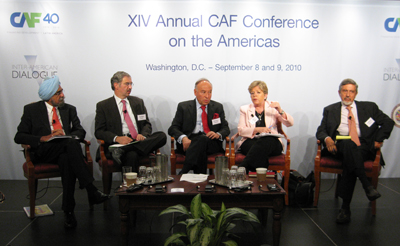Latin America Needs Long-term State Policies to Attain Growth with Equality
Work area(s)
Alicia Bárcena spoke during the XIV CAF Annual Conference on Trade and Investment in the Americas held in Washington, D.C.

(9 September 2010) "The region needs a long-term approach to attain growth with equality, State policies not with a view towards the next elections, but towards the next generations," stated Alicia Bárcena, Executive Secretary of the Economic Commission for Latin America and the Caribbean (ECLAC), in Washington today.
Bárcena was one of the leading speakers of the session "The Future of Latin America: Economic and Social Challenges over the Next 10 Years" of the XIV Annual Conference on Trade and Investment in the Americas of the Andean Development Corporation (CAF) held in the United States capital.
In her presentation, Bárcena stressed that employment is the master key, along with increasing productivity, to overcome poverty and achieve equality, as detailed in the ECLAC document Time for Equality: Closing Gaps, Opening Trails presented this year at the Commission's Thirty-third session.
"To attain more and better employment with social cohesion and environmental sustainability, we need a new equation State-market-society," she stated.
"At ECLAC we believe the region's major challenge over the next decade is not poverty, but inequality. Ten countries have reduced inequality in recent years, but there is still much to be done," added Bárcena.
Some of the main challenges for the region in its pursuit of sustained growth, she said, are creating the conditions needed to increase public and private investment and productivity. ECLAC proposes transforming productive structures in order to repair the enormous structural heterogeneity in the region's economies, reflected in evident productivity gaps, both external and domestic.
Bárcena noted that the region's trade has recovered significantly after the global crisis and total exports are expected to rise 21.4% this year. However, she alerted that the region is experiencing a strong reversal to export structures based on prime materials.
"Diversifying exports, boosting competitiveness and innovation and increasing regional cooperation will allow Latin America and the Caribbean to improve the quality of its insertion in the global economy," she said.
"We are engaging very well with the engine of the world economy, which is China at this time, but we are doing so with an export structure of the 19th century," stated Bárcena.
The other lead-off speakers at the session were Santiago Levy, Vice president of the Inter-American Development Bank (IDB), Guillermo Perry, Former Finance Minister of Colombia, and Harinder Kohli, President and CEO of the Centennial Group.
For enquiries, please contact ECLAC's Public Information and Web Services Section. Email: dpisantiago@cepal.org; telephone: (56-2) 210-2040/2149.
Country(ies)
- Latin America and the Caribbean
-
United States
Contact
Public Information Unit
- prensa@cepal.org
- (56 2) 2210 2040